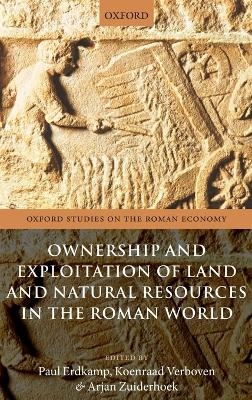
Ownership and Exploitation of Land and Natural Resources in the Roman World
Seiten
2015
Oxford University Press (Verlag)
978-0-19-872892-4 (ISBN)
Oxford University Press (Verlag)
978-0-19-872892-4 (ISBN)
This volume focuses on how the institutional set-up, or structure, of the Roman Empire positively or negatively affected economic performance.
Explanation of the success and failure of the Roman economy is one of the most important problems in economic history. As an economic system capable of sustaining high production and consumption levels, it was unparalleled until the early modern period.
This volume focuses on how the institutional structure of the Roman Empire affected economic performance both positively and negatively. An international range of contributors offers a variety of approaches that together enhance our understanding of how different ownership rights and various modes of organization and exploitation facilitated or prevented the use of land and natural resources in the production process. Relying on a large array of resources - literary, legal, epigraphic, papyrological, numismatic, and archaeological - chapters address key questions regarding the foundations of the Roman Empire's economic system. Questions of growth, concentration and legal status of property (private, public, or imperial), the role of the state, content and limitations of rights of ownership, water rights and management, exploitation of indigenous populations, and many more receive new and original analyses that make this book a significant step forward to understanding what made the economic achievements of the Roman empire possible.
Explanation of the success and failure of the Roman economy is one of the most important problems in economic history. As an economic system capable of sustaining high production and consumption levels, it was unparalleled until the early modern period.
This volume focuses on how the institutional structure of the Roman Empire affected economic performance both positively and negatively. An international range of contributors offers a variety of approaches that together enhance our understanding of how different ownership rights and various modes of organization and exploitation facilitated or prevented the use of land and natural resources in the production process. Relying on a large array of resources - literary, legal, epigraphic, papyrological, numismatic, and archaeological - chapters address key questions regarding the foundations of the Roman Empire's economic system. Questions of growth, concentration and legal status of property (private, public, or imperial), the role of the state, content and limitations of rights of ownership, water rights and management, exploitation of indigenous populations, and many more receive new and original analyses that make this book a significant step forward to understanding what made the economic achievements of the Roman empire possible.
Paul Erdkamp is Professor of Ancient History at the Vrije Universiteit Brussel. Koenraad Verboven is Professor of Ancient History at the University of Ghent. Arjan Zuiderhoek is Professor of Ancient History at the University of Ghent.
PART I: OWNERSHIP AND CONTROL ; PART II: ORGANIZATION AND MODES OF EXPLOITATION ; PART III: EXPLOITATION AND PROCESSING
| Reihe/Serie | Oxford Studies on the Roman Economy |
|---|---|
| Zusatzinfo | 41 black and white illustrations |
| Verlagsort | Oxford |
| Sprache | englisch |
| Maße | 180 x 241 mm |
| Gewicht | 796 g |
| Themenwelt | Geschichte ► Allgemeine Geschichte ► Vor- und Frühgeschichte |
| Geschichte ► Allgemeine Geschichte ► Altertum / Antike | |
| Geisteswissenschaften ► Geschichte ► Regional- / Ländergeschichte | |
| Geschichte ► Teilgebiete der Geschichte ► Wirtschaftsgeschichte | |
| Recht / Steuern ► EU / Internationales Recht | |
| Wirtschaft | |
| ISBN-10 | 0-19-872892-1 / 0198728921 |
| ISBN-13 | 978-0-19-872892-4 / 9780198728924 |
| Zustand | Neuware |
| Haben Sie eine Frage zum Produkt? |
Mehr entdecken
aus dem Bereich
aus dem Bereich
auf den Spuren der frühen Zivilisationen
Buch | Hardcover (2023)
C.H.Beck (Verlag)
20,00 €
Konzepte – Methoden – Theorien
Buch | Softcover (2024)
UTB (Verlag)
39,90 €
Was Pompeji über uns erzählt
Buch | Hardcover (2023)
Propyläen (Verlag)
32,00 €


